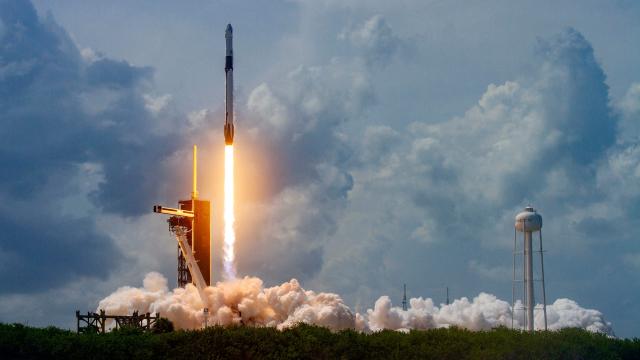Some 19 hours after the launch of SpaceX’s Crew Dragon capsule in Florida, NASA astronauts Bob Behnken and Doug Hurley have been welcomed aboard the International Space Station following a successful docking. When asked about their journey, Hurley told NASA officials back on the ground that he “couldn’t be happier” about how the spacecraft performed.
And so marks the end of America’s dependence on foreign nations for spaceflight, an era that’s spanned the last nine years after NASA retired its space shuttles.
But from the way U.S. President Donald Trump tells it, you’d think America just put every other country to shame. With his usual bombast and delusions of grandeur, he used his pulpit at yesterday’s launch to drum up some good old-fashioned “America First” dogma more fitting for the Cold War era than 2020.
Welcome aboard the @SpaceX Crew Dragon spacecraft!
In this video from space, @AstroBehnken and @Astro_Doug reveal the name of their capsule: Endeavour. Take a look inside as the crew continues their journey to the @Space_Station: https://t.co/K9S5mejONx pic.twitter.com/mvH8UhE5FW
— NASA (@NASA) May 31, 2020
“We’ll soon be landing on Mars and we’ll soon have the greatest weapons ever imagined in history,” the president said at a launch-day press conference. “In the years ahead, America will go bigger, bolder, further, faster — and America will go first. America will always be first.”
Now, of course no one’s arguing that Saturday’s launch wasn’t significant. After all, it is the first time in history that a private company has successfully launched people into orbit. But Trump’s comments frame the achievement — which really is attributable to SpaceX and not the American government — as the nation’s charge into some kind of 21st century space race.
His speech borrows heavily from the kinds of propaganda and visions of America colonising the stars spun up by U.S. officials throughout the ‘50s and ‘60s to justify spending billions of dollars in public funds on grand, extraterrestrial gestures. Some of which offered a small return in terms of scientific discoveries but carried the huge bragging rights of getting to yell “first!”
These similarities didn’t go unnoticed by America’s Cold War-era rival either.
“The hysteria raised after the successful launch of the Crew Dragon spacecraft is hard to understand,” Vladimir Ustimenko, a spokesman for Russia’s Roscosmos space agency, said about Trump’s comments per Reuters.
“What has happened should have happened long ago. Now it’s not only the Russians flying to the ISS, but also the Americans.”
Still, he had praise for America’s new milestone, calling the successful launch “wonderful.” And not to be outdone by Trump’s boasts, he added in a bit of hype for Russia’s future space endeavours as well.
“We are not going to rest on our laurels either. We will test two new rockets this year, and next year we will resume our lunar program. It will be interesting,” Ustimenko said.
Ever since shuttering its space shuttle program in 2011, NASA has relied on Russia and its Soyuz spacecraft to ferry American astronauts to and from the ISS — a service that hasn’t come cheap what with each seat costing roughly $US80 ($120) million.
However, while U.S.-Russia international relations may remain hot-and-cold on the ground, in orbit astronauts from the two nations get along nicely. On Sunday, Behnken and Hurley were welcomed aboard the station by American astronaut Chris Cassidy along with two Russian cosmonauts, Anatoly Ivanishin and Ivan Vagner. The crew will collaborate heavily throughout their stay, performing routine maintenance together, working as a team in the orbiting lab, and sharing meals.
[referenced url=”https://gizmodo.com.au/2020/05/spacexs-starship-prototype-explodes-in-fourth-failed-test/” thumb=”https://gizmodo.com.au/wp-content/uploads/2020/05/30/uka7pliea4yhvjmlrtyy-300×175.gif” title=”SpaceX’s Starship Prototype Explodes in Fourth Failed Test” excerpt=”Like everything else in 2020, the fourth prototype of SpaceX’s next-generation rocket has gone up in flames. It’s the latest in a series of spectacular explosions to plague the company’s Starship program.”]
It remains uncertain exactly how long the station’s latest newcomers’ stay will be. NASA officials estimate they’ll remain on the ISS for at least a month, though they could be returning to Earth as late as September.
On Saturday, Trump declared that“[t]oday’s launch makes clear the commercial space industry is the future.”
That much is no exaggeration. While the date is far from being set in stone, NASA and SpaceX are already looking to August 30 for the next Crew Dragon launch.
